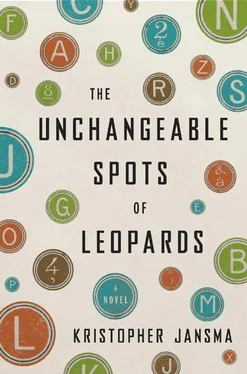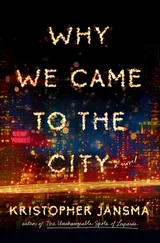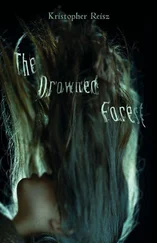And then she kissed me, and I could feel the wet pulp of tobacco and the crimson of her lips coming off on mine.
“What’s the matter?” she asked.
“Nothing,” I said. “I’m sorry.”
She smiled and kissed me again.
And I thought about what Sokol had said: that happiness was making love for as long as you could stand it to the most luminous thing you could find on this rotten corpse of a planet. And, afterward, I thought he might be right. And so she did not go back to Julian’s room that night to report back on my writer’s block. And so, all morning as she slept in my bed, I furiously tapped away at the keys of my computer. Just two pages at first. Truth. And then five. Forget this slant business . And then twelve. Tell all the truth. And then a title. “The Trouble with Ibsen.” And then it was done.
Later that morning, Julian and I turned in our stories at the end of Morrissey’s class without a single word to each other. He looked as though he’d gone ten rounds with a gorilla and decided to wear part of its pelt on his chin as a trophy. There were rings around the rings around his eyes. He grunted at me, as if to acknowledge that it was over, and staggered off to sleep for as long as humanly possible. He never even asked me where Evelyn had gone, which was probably for the best, because Shelly was, at that very moment, turning in her own story, which she’d titled “Just Like Starting Over.”
“I printed one for you, too,” she said, offering me the copy and giving my hand a squeeze — surprising both in its affection and strength. “I knew you could do it. I can’t wait to read yours.”
My palms began to sweat, and for the first time the hours of sleeplessness felt caked onto my face. I hadn’t showered. My fingers flew to my lips, sure that some lipstick must still be smudged there. The scent of Evelyn was deep underneath my nails.
“I’ll just have to go back to my room and print out another,” I lied, hiding the spare copy of “The Trouble with Ibsen” that I’d printed to give to Julian.
“I was kind of hoping you’d say that,” she said, making a move to follow me there.
I’d never cheated on anyone before. I felt like slime, but weirdly grown-up slime. Shelly stood there, chewing on the ends of her black hair, dark eyes expectant. Whatever damages had been done to her already — and there must have been some — I knew I did not want to add to them. Nervously, I stared down at my watch.
“Let’s meet for coffee in an hour? I really need to shower,” I said as means of an apology. And I kissed the straight-cut bangs that hung in her big eyes and rushed off.
As guilty as I felt, I couldn’t help hoping that Evelyn would still be in my room. But she was already gone, vanished, off reading Ibsen around a table somewhere. Was she thinking about me? Why had I told her I didn’t have any money? But was there something else? The bed was empty except for her lingering smell, powdery and rich like the confections we’d kept behind the counter at Ludwig’s. It was all I could bear not to dive down into it and drift off to sleep. If I never resurfaced, I don’t know that I’d have minded. But I showered, printed out a copy of “Just Another Bastard Out of Carolina” instead of my actual submission, and skimmed Shelly’s story. It was about a single mother, trolling around a bookstore and planning to leave her screaming baby in the True Crime section before driving her car over an embankment. But right at the end, she hears a young poet giving a reading in the café. And his poem sends her wailing baby into a deep, undisturbable sleep, and the mother feels hopeful for the first time in months.
Silently I reminded myself that Evelyn was not my girlfriend. And that after her audition she’d go back to New York. And Shelly would never have to know.
• • •
A few frigid weeks passed and I wondered, each day, when we’d hear about the contest. Julian and I did not speak — I did not know if he was upset about Evelyn, or anxious about the contest, or simply out of his mind. In class he sat, entranced by the snow falling on the windows, and said nothing at all to me or anyone else.
“Pinkerton? McGann?” Professor Morrissey called to us hopefully, when no one at all reacted to his story about how Hemingway’s wife lost the only copy of his first novel on a Parisian train. We each faked a smile.
Then suddenly, overnight, Abernathy Hall was covered in flyers with Julian’s picture on them. Shelly and I stumbled across one on our way to class.
Come see writing contest winner Julian McGann read from his story “Just Before the Gold Rush.” Jan Sokol will also read from his forthcoming novel, Luminous Things . Tonight! Osgood Auditorium!
Neither of us was surprised to find that Julian had won, though we were a little annoyed that nobody had even bothered to let us losers know that we had lost. Down at the bottom of the flyer were the opening lines of the story, meant to entice us into attending the reading.
In 1851, on the continent of convicts known then as Australasia, before the gold mines of Kimberley were famous and the population of that island tripled with men searching for New South Wales’s very own El Dorado, young Shamus McGarry, a poor Irishman indentured to the Clarke Mining Corporation, had already spent six dark years sifting infinitesimal specks of gold from the earth. But then came the day that he and his partner stumbled upon a pure nugget the size of a man’s heart. Shamus and this other man instantly turned their pickaxes on one another. By luck or by fate, Shamus’s ax crushed the nameless man’s skull first — or else Shamus would have been the one without a name. He emptied the man’s skull, hid the golden lump inside, and then tore down the surrounding rock. He convinced the foreman that the wall had collapsed. It was easy enough to dig the man up from the grave pit that night. It was easier still to hide the heart-sized nugget inside his mouth and flee West, toward freedom, and fortune.
• • •
Australasia? New South Wales? Gold nuggets hidden in the drained skull of a murdered miner? It seemed patently unfair — just blatant showing off. I was keenly aware of being both outraged and jealous at the same time. Why hadn’t I been able to come up with anything like this? Was this slant ? This fantastic impossible dream? Made real with just the right words, with just the right sentences. Was I even capable of it? Or was Julian, as I’d feared, simply imbued with powers I would never possess?
That night at the reading, I arrived with Shelly, who joined me in laughing at the parade of casual pretension that was settling into the auditorium around us: a white-bearded professor in an off-kilter black beret, a girl with two peacock feathers woven into her hair, a boy in a twenties-era gangster hat toying with a cigarette tucked behind one ear.
“I don’t look like a writer at all,” I lamented, looking at my lightly stained button-down shirt.
“You look more like a waiter,” Shelly teased. I had not even told her that I had worn this same shirt for three long summers, as I served pastries and espressos at Ludwig’s Café to people dressed just like the alumni who were steadily streaming into the reading. Shelly was wearing a simple, slim black dress that almost made me forget about my fear of breaking her.
“Get a load of this one,” Shelly said, rolling her eyes at the doorway.
I turned and to my great surprise saw Evelyn enter the room. Evelyn Lynn Madison Demont. In the same leopard-skin hat, with the same high cheeks and bored eyes. The noisy chatter of the room seemed to fall away to whispers. My heart pounded thousand-degree blood out through every capillary I possessed. I had begun to forget her, the smell of sunlight in her hair and the taste of sweet tobacco on her lips, but the moment she walked in I could smell and taste nothing else. I shrank down in my seat suddenly, trying not to let Shelly see how red I’d gotten. Evelyn was followed in by a sour-faced woman with long, glamorous dark hair and a stern-looking gentleman in a tuxedo who looked just like Julian, but with less hair. They both looked as though they might buy the auditorium just to burn it to the ground. Even in this crowd they seemed most assuredly a cut above the rest.
Читать дальше











